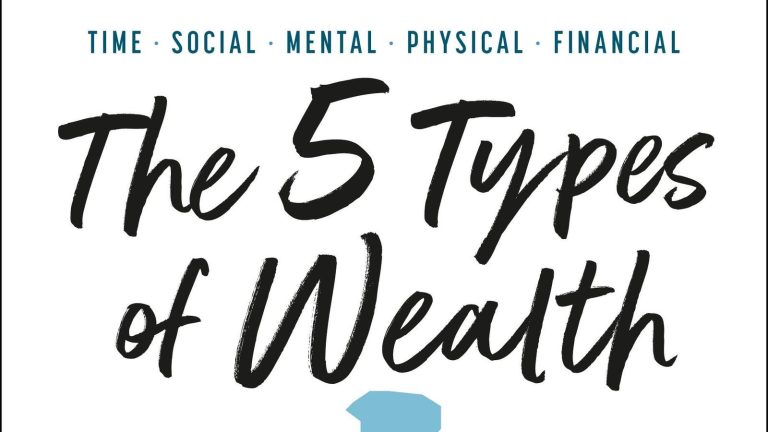Fortunately, we’re in one of those seasons when we get headlines about new market highs pretty regularly as one or the other index surpasses a new, never-before-seen threshold. These benchmark superlatives tend to inspire a moment of celebration—only to be soon followed by hours of anxiety, as investors ponder when their new all-time high will inevitably become a low.
Well, I’ve got some good news: Assets with historically positive rates of return should regularly, if not indefinitely, be hitting new all-time highs. And personally, you should, too—that is, if you’re measuring success correctly. Entrepreneur, investor, and author Sahil Bloom explores this firsthand in his new book, The 5 Types of Wealth. But there’s a twist.
You see, Sahil had done everything to set himself up for success. He was a four-year baseball player at Stanford with prospects for the next level. But he didn’t go pro. Compelled by a friend to pursue a job in high finance, under the presumption that, “…by the time you’re thirty, you’ll be making more money than you know what to do with,” he went that route.
“That sounded pretty damn good to me on the basis of one simple, foundational assumption,” writes Bloom: “Money will lead directly to success and happiness.”
Overachiever that he is, Sahil checked all the boxes, did all the things, had all the things. He was 30 years old, making millions of dollars a year, and had all the visible signs of success, but he was miserable. “I realized I had achieved all of it,” he writes, “and all I could think was Is this it?”
Is this it?
Regardless of the circumstances, I know you’ve had an “Is this it?” moment. Maybe it was a story that was similar to Sahil’s, related to professional or financial success. Maybe it was related to a success you experienced in sports or the arts. Indeed, how many great artists alone have been lost way too early because they couldn’t handle the deification of superstardom?
Or maybe it was something less visible and more personal. Perhaps you married your dream girl or guy, only to learn months or years later that love isn’t just a feeling—it’s work. You got the 2.5 kids, the labradoodle, and the white picket fence around it all, only to ask Is this it?
I have to come clean, too. The first time I got a book deal with a publisher, then when the book got published, then when it got a superlative review in USA Today, then when I got a chance to talk about my work on NBC’s TODAY show… I remember distinctly thinking that each of these successive moments was definitive in my career—that a lifetime of success was a virtual guarantee—only to realize that tomorrow comes just the same. It was a false summit, and there was another, much larger, hill to climb, again and again.
Bloom defines this false summit as “the arrival fallacy…the false assumption that reaching some achievement or goal will create durable feelings of satisfaction and contentment in our lives.”
“But the fallacy of it is that you get to that point, you feel this momentary blip of happiness, and then it immediately resets to something further out on the horizon,” Sahil explained further when we spoke about the book. “It resets to being three million or five million or ten million. The new promotion, the new title, the fancier house, the nicer car—all of those things. And you are making your happiness and your contentment and your fulfillment conditional on some future state that you need to achieve.”
Another phrase that has been used to describe these all-too-fleeting mountain-top feelings is hedonic adaptation, more commonly known in the pejorative, the hedonic treadmill—the idea that as soon as we get to the finish line, we envision yet another finish line in the distance. But here’s that aforementioned twist.
Here comes the twist.
As with many behavioral biases that have been miscast as inherently negative, the arrival fallacy and the hedonic treadmill may be features, not bugs, in our human hardwiring. As Dr. Meir Statman is quick to remind us, behavioral finance isn’t all bad behavior. For example, were it not for Sahil reaching his pre-pinnacle moment and finding it lacking, you wouldn’t be reading this post because he wouldn’t have written the book.
He’d be content to rake in his millions putting private equity deals together—not that there’s anything wrong with that—and he wouldn’t have made it his life’s mission to extrapolate the ancient wisdom he learned experientially.
That wisdom, by the way, is that wealth is far more than money—a conclusion that, having spent 28 years in wealth management, I’m inclined to support with a standing ovation.
The Wrong Scoreboard
Money is certainly a part of wealth, but in The 5 Types of Wealth, Sahil extrapolates further to discuss our time, social, mental, and physical wealth, in addition to our financial. He told me that what we really have is a scoreboard problem. “The scoreboard that we use to measure our success, our wealth, our life worth is money. And that is because money is so damn measurable. It is such an easy thing to put a single number around and then to track.”
Thankfully, Bloom doesn’t just diagnose the problem—he provides a master class on how to measure and invest in all five types of wealth, not just financial. This collective wisdom offers a road map for a life perpetually filled with all-time highs.
But I have one more piece of good news for you.
More good news
Thankfully, the arrival fallacy doesn’t just apply to the great things that happen in our lives, the pinnacle moments. It also applies to the challenges and valleys we endure. It’s altogether possible that you’re going through one of those moments right now, and I’m pleased to report that your hardship is no more definitive than your greatest moment to date.
Nobel laureate and founding father of behavioral economics, Daniel Kahneman, put it this way: “Nothing in life is as important as you think it is while you are thinking about it.”
This applies to our highs and our lows, and most of our life is lived in the vast in-between moments.
Yes, like the markets, we will experience volatility in both the upward and downward direction. But when we better understand true wealth, the insatiability of More, and the uncommon comfort of Enough, we position ourselves to enjoy a perpetual series of all-time highs.
Read the full article here








